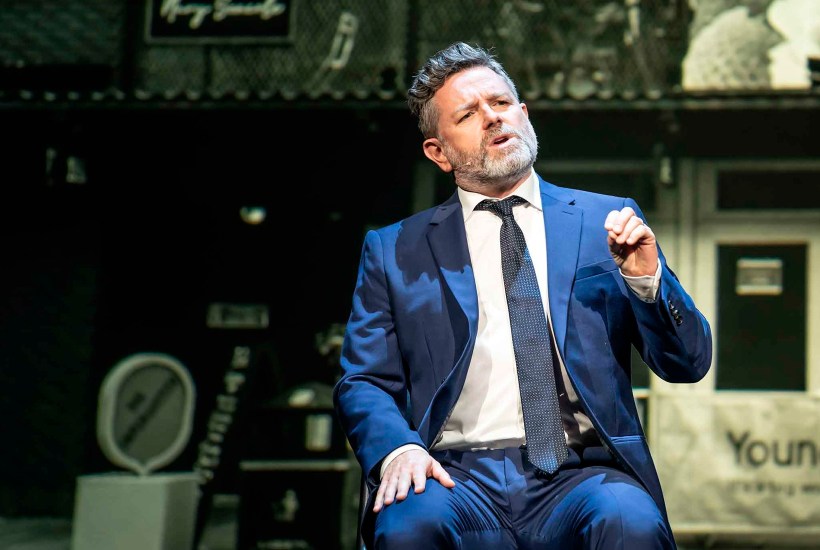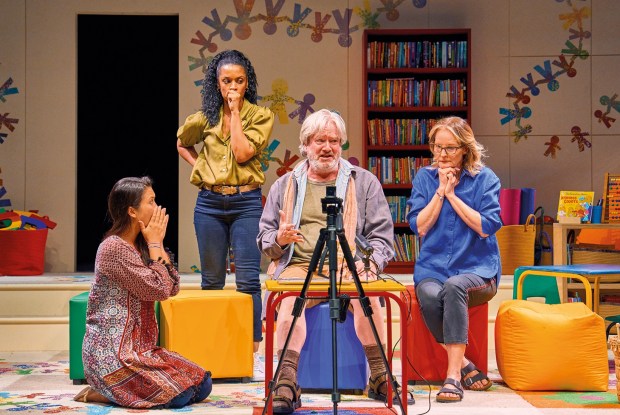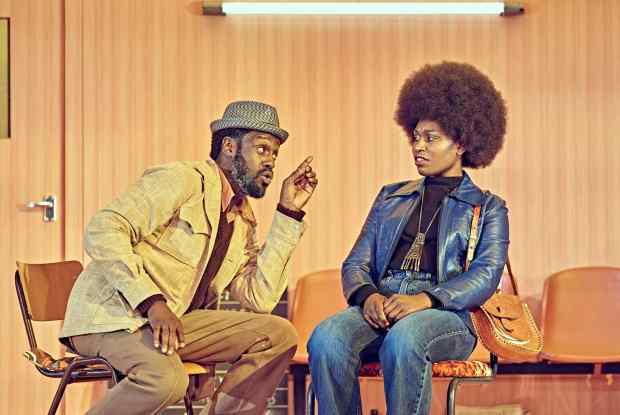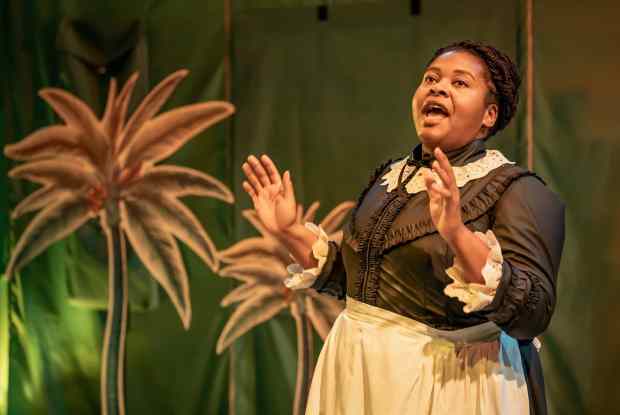When Kwame Kwei-Armah took over the Young Vic he strapped a ‘Black Lives Matter’ sign over the front of the building. One of BLM’s aims is the overthrow of capitalism and it’s widely assumed in theatreland that Kwame, who is great fun to meet, has embraced this goal by adjusting the Young Vic’s pay structures so that he earns no more than the bar staff and the cleaners. Happily the pay cut seems not to have affected his mood, and last weekend he was fizzing with anticipation as he hosted the Young Vic’s 50th birthday gala.
‘We’re in the house. Make some noise,’ he cried. ‘Shake off the cobwebs!’
He introduced a medley of performances by ‘artists, thinkers, academics and musicians’. And he added a health warning: ‘The scripts arrived this week. We just wanted it to pop up and fill the space.’
Things started badly with ‘Cities of Forgetfulness’, by Shahidha Bari. This portentous tract set out to teach us what art is. ‘Art works on the collective body that is an audience.’ Many such clunking platitudes followed. ‘We share a human susceptibility to pain and suffering but also to love and joy.’ Bari spoke of art forms that ‘remind us life is not to be sacrificed or reduced to spikes and statistics’. And she argued that art should challenge ‘a government that ruthlessly profiteers from suffering’. Is that art? It sounds like a chippy Newsnight polemic.
Next came a wish-fulfilment fantasy by Steve Waters about a Marxist civil servant (played by Matthew Dunster) who resigns from the Treasury after directing a foul-mouthed rant at the Chancellor about what a ‘shambles this last six months has been.’ Then he started to sing ‘Don’t Stop Thinking About Tomorrow’ by Fleetwood Mac. He praised the band for turning their pain into music and ‘making a mint’. Somewhere in this bizarre monologue lay a brilliant satire on Marxist hypocrisy. But it needed more jokes.
Good pieces followed. A poem called ‘Hope’ by Jade Anouka fulfilled the promise of its title. In a comic sketch, ‘Emoji Tennis’, a deaf girl tried to hook up online with boys who insisted on performing sign language naked. Great stuff. There’s a play in that. Then came a fretful white poet who seemed traumatised by Britain’s colonial past. ‘We raped and pillaged and took their lands,’ he confessed. He then apologised for apologising and admitted that he wasn’t as well qualified as black poets to analyse patriarchal imperialism. And he stated openly how fearful he was that his support for BLM would attract online abuse: ‘It’s the first time I’ve been worried about my colour in my life.’ He said that as if it were a good thing.
The angriest piece, ‘Black Pain Redux’, was by Jasmine Lee-Jones. She has endured some terrible ordeals in her life, compounded by ill-trained medical staff. When she was 19, a man attempted to rape her but her therapist defended him because, after all, ‘it was his house’. Lee-Jones once took an overdose and was rescued from a coma by a white paramedic who tried to chat her up in the ambulance.
No wonder she’s fuming about society which she calls ‘a minstrel-inspired freak show of white patriarchal dominance’. When white people endorse BLM she feels obliged to be ‘extra nice’ to them and yet this behaviour is ‘rooted in the racist belief that if I’m nice I’ll be favoured’. This in turn sustains white supremacism by ‘ensuring the centring of white people’. It would be hard to imagine a more nihilistic attitude to the anti-racism movement. It got worse. She dislikes certain black people who side with BLM too. When John Boyega endorsed the campaign he linked his stance to his Hollywood career. This got her goat. Instead of hogging the spotlight ‘he should be using every square inch to centre and to platform members of his marginalised group’.
Her piece was performed with intimate needling anger by Paapa Essiedu who was educated at an excellent private establishment, Forest School in Epping. (My son applied for a place but was rejected.) At the end Kwame called on the crowd to salute the team of angry pipsqueaks and self-righteous malcontents he had assembled for our entertainment.
Finally, a joke. One of the show’s key aims was to attack ‘the patriarchy’ (meaning ‘the rule of the fathers’) so it was peculiar to hear Kwame reveal that the in-house DJ was Kwame Kwei-Armah Jr. Any connection with the boss is probably coincidental.
Got something to add? Join the discussion and comment below.
Get 10 issues for just $10
Subscribe to The Spectator Australia today for the next 10 magazine issues, plus full online access, for just $10.
You might disagree with half of it, but you’ll enjoy reading all of it. Try your first month for free, then just $2 a week for the remainder of your first year.














Comments
Don't miss out
Join the conversation with other Spectator Australia readers. Subscribe to leave a comment.
SUBSCRIBEAlready a subscriber? Log in